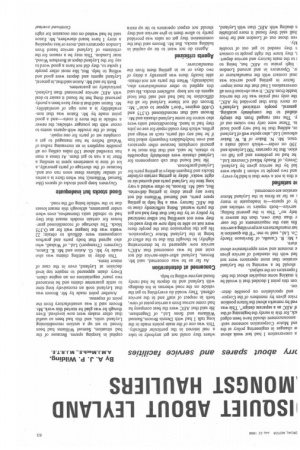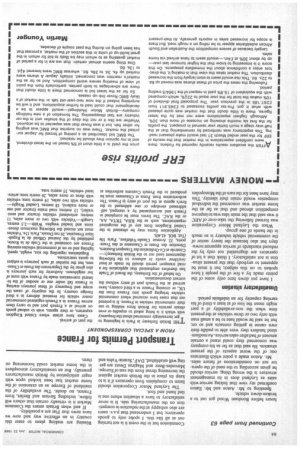ISQUIET ABOUT LEYLAND MONGST HAULIERS
Page 65

Page 66

If you've noticed an error in this article please click here to report it so we can fix it.
arry about spares and service facilities
By A. J. P. Wilding, A.M.I.Mech.E., M.I.R.T.E.
a conversation I had last week about le changes in engineering policy at the tnd Motor Corporation someone said: announcement should have been edged ick, for this is surely the beginning of the 3f AEC as a separate design". This was wed by remarks about the future position rvice given by members of the Corporand speculation on possible deterion.
'om this point I decided that it would be h making some enquiries about the feelf operators on the subject.
should be a warning to the Leyland *ration that most operators were not fied with the standard of service given e moment and were apprehensive about tture.
s Mr. R. Canelle, of Stevinson Hardy Co. Ltd., said to me: "If the question is her manufacturers are prov iding a service fits into the requirements of the user than their own, then the answer is itely no". This is the general feeling; service—both repairs to vehicles and ly of spares—is inadequate in many i as far as firms in the Leyland Motor *ration are concerned.
ie satisfied
it this is not a view that is held by everyand two people to whom I spoke were led by the service given by Leyland. Ciresty, of Ready Mixed Concrete Ltd., he had no problems and got full co; ttion. But he operates 700 Leylands and 350 on order—which could make a -ence. Mr. N. Baker of R. W. Baker iehouse) Ltd., also spoke well of Leyland ce, adding that he had very good local ts. These were only two voices out of y. The rest ranged from the simply itisfied to the completely scathing. general, people criticized Leyland's ce more than that provided by AEC, the only real praise was for the service inable from AEC. It was obvious from all :onversations I had that the most imporfactor in getting good service was °nal contact with the manufacturer or 5r.. Operators in and around London
high praise to AEC but, being so to the main factory and service departt, they knew the right people to contact ri they needed to get out of trouble kly.
ven those out of London and far from .hall said they found it more profitable n dealing with AEC than with Leyland, where they could not get anybody to take a real interest in the particular difficulty. This was one of the main points made in the long talk I had with Dennis Broom, Samuel Williams and Sons Ltd., of Dagenham. He said that AEC were the best company he had come across from a service point of view, both in respect of staff and in the service offered. They would do everything to get the vehicle on the road whereas in his dealings with Leyland and its depots he had rarely found anyone willing to help.
Concerned at deterioration
As far as he was concerned, said Mr. Broom, Leyland after-sales-service did not exist and he was concerned that AEC's service now appeared to be deteriorating slightly; he thought this due to the effect of being in the Leyland Motor Corporation. He got the impression that the people there were not so able to help now as they used to; they were not unwilling but either restricted by policy or by the fact that they had not got the parts wanted. Being sufficiently close to the AEC factory was a big help in getting spare parts, and Samuel Williams did not have any great delay in getting deliveries. But, said Mr. Broom, he often waited a very long time for Leyland parts and quoted six to eight weeks' delay in getting certain cylinder blocks and frequent delays in getting parts for Leyland gearboxes.
He had found that cab components for Leyland chassis were absolutely impossible to obtain, he said, and that this must be a general complaint because other operators and even bodybuilders frequently asked him if he had any old parts, such as wings and grilles, which they could repair for use on jobs they had in hand. Reconditioned units were also scarce for some Leyland chassis and Mr. Broom said that reconditioned 0.375 and 0.400 engines "don't appear to exist". Mr. Broom did not blame Leyland for all the difficulties he had had and said that local agents do not keep sufficient stocks. He said this applied to other manufacturers also, incidentally. When the parts are not obtainable locally there was generally a delay of two days or so in getting them from the manufacturer.
Agents criticized
Agents do not want to tie up capital in holding stocks. But Mr. Broom said that the commission they get on sales was provided partly to allow them to give service and they should not expect operators to tie up extra capital in keeping spares. Because of the bad situation, Samuel Williams had been forced to set up a section reconditioning Leyland units, and this had been so useful that other makes were now involved. Even though he was glad he started this work, Mr. Broom said it was unsatisfactory from the point of expense.
Another point made by Mr. Broom was that Leyland took an excessively long time to settle guarantee claims and he instanced two years' negotiations on an engine claim. Every claim appeared to require top level decision at Leyland, even in the case of minor items.
This delay in settling claims was also made by Mr. G. Aston and Mr. K. Eaton, Guymers (Transport) Ltd., of Walsall, who also agreed that body parts and gearbox components were difficult to obtain; 22 weeks was the longest wait for an 0.375 block. The shortage of reconditioned gearboxes for certain models meant that they had to rebuild units themselves, even when under guarantee, although this meant losses due to the vehicle being off the road.
Good stocks but inadequate
Guymers keep good stocks of spares (like Samuel Williams); but when there is a series of similar failures these soon run out and. because of the shortage of parts generally, a lot of time is sometimes spent in sending a fitter in a van to get them. At times a man has travelled about 150 miles calling on all possible suppliers in an increasing radius of Walsall before he has managed to get a complete set of parts for one repair.
Most of the trouble with .spares seems to occur with the younger vehicles; the newer a vehicle is the more it costs—and a good point made by Mr. Eaton was that nonavailability is a sure sign of unreliability. Mr. Eaton said that it may have been a purely personal thing but he found it easier to deal with AEC service personnel than Leyland, particularly on guarantees.
Both he and Mr. Aston said that, in general. Leyland agents and depots were good and willing to help. But, like most other people I spoke to, they did not have a good word to say for the Leyland depot at Boreham Wood, near London. This may he a reason for the criticisms of Leyland service heard from London operators and, more or less repeating a story I have heard elsewhere, Mr. Eaton said he had waited on one occasion for eight hours before Boreham Wood got out to a broken-down vehicle.
Speaking to Mr. Aston and Mr. Eaton confirmed my view that linking service with sales as Leyland does in its management structure is the wrong thing; service should be given according to the need of the operator not on considerations of future sales.
Mr. Aston made a point which illustrates one of the worst aspects of the present situation. He said that as far as his company was concerned they could stand a certain amount of bad after-sales service. As mediumsized hauliers they were able to paddle their own canoe in getting contacts and so on; but he said he would hate to be a small man with only two or three vehicles at the present time when the non-availability of a part might mean the loss of at least a third of his earning capacity for an indefinite period.
Unsatisfactory situation
I have put down here only some of the points made by a few of the people I have spoken to on this subject; but it must be apparent to anybody that the present situation is not satisfactory. I think that a lot of operators are disgruntled not only by the reduced standards of service apparent nowadays but also because the heavy sector of the commercial vehicle industry is so much in the hands of one group.
When the Leyland Motor Corporation was formed following the take-over of AEC it was said that the main idea was to improve competition abroad and that as far as the home market was concerned the individual companies would retain their identity. This may have been for the ears of the Monopolies Commission but in the event it is not turning out at all like this. I spoke only to goods operators; but I understand that p.s.v. users are also unhappy at the reduction in competition on the manufacturing side. It is never satisfactory to have a situation where one is tied hand and foot.
The Leyland Motor Corporation should listen to complaints from operators if it is to keep its place in the British market against the increasing threat from the rest of Europe. Mercedes-Benz and Magirus Deutz are getting well established, DA F, Scania-Vabis and Bussing are making plans to enter this country in an effective way and now we have news that Fiat are a possibility.
If and when Britain enters the Common Market it is virtually certain that others will follow, including Saviem and Berliet, from France, no doubt. The availability of the mainland of Europe as an extension of the home market has been looked upon with eager anticipation by British manufacturers generally. But an unsatisfactory atmosphere in the home market could boomerang on them.
























































































































